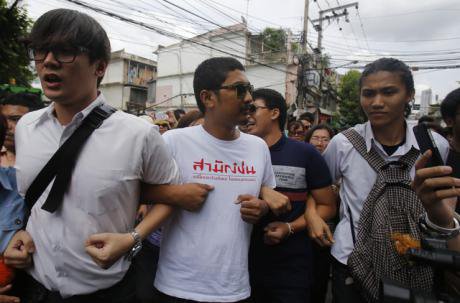
Student activists gather outside Pathumwan Police Station in Bangkok, Thailand, on 24 June 2015 Associated Press Photo/Sakchai Lalit. All rights reserved.Once again the world is raising a toast to Human Rights Day (10 December) marking almost seven decades since the adoption of the Universal Declaration of Human Rights. While many, including young human rights defenders and supporters, vigorously raise their voices observing on their achievements throughout the year, many are finding themselves at risk for speaking up for human rights and freedom of expression. In Asia, many voices have been systemically silenced for merely speaking about this. Human rights belong to every ‘human’ since birth irrespective of who the person is and what they represent, politically or otherwise; a quality that cannot be taken away or given.
Human rights belong to every ‘human’ since birth irrespective of who the person is and what they represent, politically or otherwise; a quality that cannot be taken away or given. Yet across many Asian countries the perception of those defending or promoting human rights are increasingly seen as negative if not pejorative; to many, these two magic words are becoming analogous to toxic narratives. Taking actions for or expressing opinions (peacefully) in the public about human rights are frowned upon, from an uneasy awareness that those actions or views may not correspond to the “official parameters”.
In fact, the civic space is shrinking at an unprecedented rate.
The past few years have seen countless instances of students and young activists taking actions in the public space – online or offline – who face retaliation from state authorities and others. From arbitrary arrest of a sixteen-year old blogger in Singapore for publically expressing political opinions, to a massive crackdown on students for peacefully protesting against restrictive Education Law in Myanmar, and a student activist from Hong Kong denied entry to speak about human rights in Thailand.
One shared characteristic among these young people perhaps is their conviction about what they believe in and their audacity in speaking out against closed or repressive systems. However, due to their specific identities, especially those associated with their age, young people are particularly susceptible to different threats.
Some like to argue that being ‘young’ equates with being immature, idealistic and troublemakers – hence such inevitable reprisals. While the validity of such claims can sway in both directions, a lack of youth inclusion and representation in political processes means they could all the more be dismissed and denied due recognition, respect and security in general.
In spite of the universal guarantees of human rights, these two magic words are hijacked in reality. In the view of international legal standards and legal principles, “youth rights” are defined as the ‘areas of law dealing with the rights of young people’. In other words, these could be interpreted (purely) as a human right-based foundation for the rights of young people.
In light of this, youth are being placed in an even more ambiguous position in regions including ASEAN, where human rights standards are poorly applied, without necessary instruments to provide essential formal legal means and sources of protection. Despite States’ obligation to respect and promote these rights, young people in the region are consequently left to their own devices, especially when it comes to their civic engagement. National security, economic and social development, religious norms and practices are a few of the reasons given to justify attacks on those defending human rights.
National security, economic and social development, religious norms and practices are a few of the reasons given to justify attacks on those defending human rights. While these may not be altogether surprising, they reflect the overall condition of society across different sectors including the crucial public space.
In spite of all these challenges and gaps, there is ample room for improvement in terms of public perception of young people doing what they are doing (i.e. defending human rights and freedoms). Young people need to be judged on the merits of their contribution and the change they make in society while being understood and supported, in the context of the shrinking space in which they are operating and the very specific risks faced.
In the same vein, the aggressive narratives (part of a global trend towards a right-leaning shift), which give rise to the increased stigmatisation of “the promoters” of human rights, needs to be confronted worldwide. Existing narratives need to be straightened out with due recognition finally being given to those risking their lives in the fight for justice.
While it is the task of governments to adopt and implement certain policies that provide adequate protection mechanisms, as well as for organisations and activists themselves to work better together, the legitimacy of young human rights defenders will only be safe when there first exists public awareness and a sense of solidarity, holding open the space for those who want to speak about human rights to speak out.
(Disclaimer: Aanas Ali contributed this article in his personal capacity. The views expressed are his own and do not necessarily represent the views of Amnesty International.)
Read more
Get our weekly email
Comments
We encourage anyone to comment, please consult the oD commenting guidelines if you have any questions.